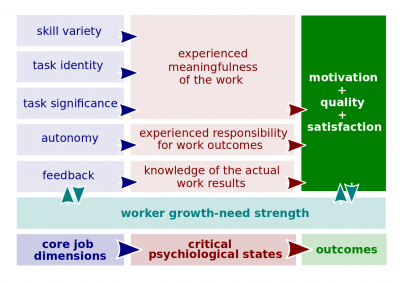Difference between revisions of "Job Dimensions"
m (Gary moved page Core Job Dimensions to Job Dimensions without leaving a redirect) |
(→Script) |
||
| Line 16: | Line 16: | ||
===Script=== | ===Script=== | ||
| − | :The [[Job Characteristics Model]] is the framework that identifies five [[core job dimension]]s, their interrelationships, and their impact on one's work outcomes. These ''dimensions'' have been identified while analyzing various [[job characteristic]]s. The ''dimensions'' include [[skill variety]], [[task identity]], [[task significance]], [[autonomy]], and [[feedback]]. | + | :Any [[job]] or its smallest part, a [[job task]], can be aligned with various dimensions. |
| + | |||
| + | :The [[Job Characteristics Model]] is the framework that addresses what job motivates an [[employee]]. The model identifies five [[core job dimension]]s, their interrelationships, and their impact on one's work outcomes. These ''dimensions'' have been identified while analyzing various [[job characteristic]]s. The ''dimensions'' include [[skill variety]], [[task identity]], [[task significance]], [[autonomy]], and [[feedback]]. | ||
:[[Skill variety]] refers to the variety of [[work activity|work activiti]]es that require various skills and talents to apply at a particular job. | :[[Skill variety]] refers to the variety of [[work activity|work activiti]]es that require various skills and talents to apply at a particular job. | ||
Revision as of 23:26, 5 May 2020
Job Dimensions (hereinafter, the Lectio) is the second lesson part of the Nature of Work lesson that introduces its participants to work characteristics and related topics.
This lesson belongs to the Introduction to Employment session of the CNM Cyber Orientation. The Orientation is the second stage of the WorldOpp Pipeline.
Contents
Content
The predecessor lectio is Work Arrangements.
Key terms
- Job Characteristics Model. The framework for analyzing and designing jobs that identifies five core job dimensions, their interrelationships, and their impact on outcomes. These core job dimensions include skill variety, task identity, task significance, autonomy, and feedback.
- Skill variety. The degree to which a job requires a variety of activities so that an employee can use several different skills and talents.
- Task identity. The degree to which a job requires completion of a whole and identifiable piece of work.
- Task significance. The degree to which a job has a substantial impact on the lives or work of other people.
- Autonomy. The degree to which a job provides substantial freedom, independence, and discretion to the individual in scheduling work and determining the procedures to be used in carrying it out.
- Feedback. The degree to which carrying out the work activities required by job results in the individual obtaining direct and clear information about the effectiveness of his or her performance.
Script
- The Job Characteristics Model is the framework that addresses what job motivates an employee. The model identifies five core job dimensions, their interrelationships, and their impact on one's work outcomes. These dimensions have been identified while analyzing various job characteristics. The dimensions include skill variety, task identity, task significance, autonomy, and feedback.
- Skill variety refers to the variety of work activities that require various skills and talents to apply at a particular job.
- Task identity is the degree to which a job requires completion of a whole and identifiable piece of work.
- Task significance refers to the job's impact on the lives or work of other people.
- Autonomy is the degree to which a job provides substantial freedom, independence, and discretion to the individual in scheduling work and determining the procedures to be used in carrying it out.
- As a core job dimension, feedback refers to the quality of information about the employee's performance.
Task Attributes is the successor lectio.

